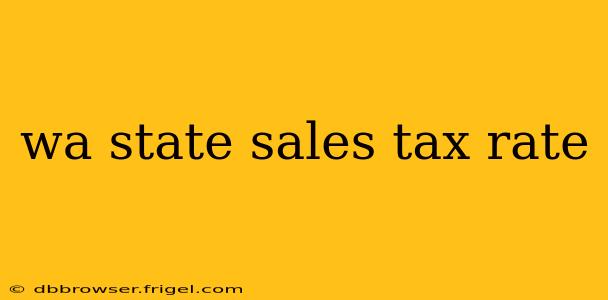Washington State doesn't have a statewide sales tax. This is a significant difference compared to most other states in the US, and understanding the nuances of Washington's tax system is crucial for both residents and businesses. This guide will break down the complexities and answer common questions regarding Washington's sales tax, or rather, the lack thereof.
Is there a sales tax in Washington State?
The short answer is: no, there is no statewide sales tax in Washington. This means that there's no general tax added to most purchases at the point of sale. However, this doesn't mean there are no sales taxes in the state. The lack of a statewide tax is a unique aspect of Washington's tax structure.
What types of taxes do exist in Washington State?
While there's no statewide sales tax, Washington does have other taxes that affect consumers and businesses:
-
Local Sales Taxes (excise taxes): Many cities and counties in Washington impose their own local sales taxes, also known as excise taxes. These rates vary significantly depending on location. Some areas have no local sales tax, while others have rates ranging from 0.1% to a few percentage points. It’s essential to check the specific tax rate for the city or county where the purchase is made. Businesses often display the applicable local rate at the point of sale.
-
B&O Tax (Business & Occupation Tax): This is a tax levied on the gross receipts of businesses operating in Washington. The rate varies depending on the type of business activity.
-
Use Tax: Washington residents who purchase goods outside the state and bring them into Washington may be liable for a use tax, equivalent to the local sales tax rate where they reside. This is designed to prevent people from avoiding paying local taxes by buying goods from out of state.
-
Specific Excise Taxes: Washington has specific excise taxes on certain items like motor vehicle fuel and alcohol. These are separate from any local sales taxes.
What is the sales tax rate in my city/county in Washington?
To determine the precise sales tax rate for a specific location in Washington, you should consult the relevant city or county government website. The Washington State Department of Revenue website also provides resources to look up local sales tax rates. Alternatively, you can check directly with the business where you're making the purchase.
How does the lack of a state sales tax affect Washington residents?
The absence of a statewide sales tax has both advantages and disadvantages for Washington residents:
-
Advantage: Consumers generally pay less in sales taxes compared to states with statewide sales taxes.
-
Disadvantage: The reliance on local sales taxes and other taxes like the B&O tax can lead to inconsistencies in tax rates across the state, making it more complex to calculate and track taxes.
What is the difference between sales tax and use tax in Washington?
Sales tax is collected at the point of sale when purchasing goods within Washington state, based on the applicable local rate. The use tax applies when Washington residents purchase goods from out-of-state sellers and bring them into Washington without paying sales tax at the point of purchase. The use tax rate is the same as the local sales tax rate applicable to the resident's location. Essentially, it's designed to level the playing field, ensuring that residents aren't circumventing local taxes.
How can I find the sales tax rate for a specific purchase I'm making in Washington?
The most accurate way is to check with the business making the sale. They will be able to tell you the exact local sales tax rate applicable to your purchase. Many businesses post this information clearly at the point of sale. You can also search the Washington State Department of Revenue website for local tax rates.
This guide provides a comprehensive overview of the Washington State sales tax (or lack thereof). Always consult official government sources for the most up-to-date and precise information. Remember that tax laws can change, so periodic review is recommended.
